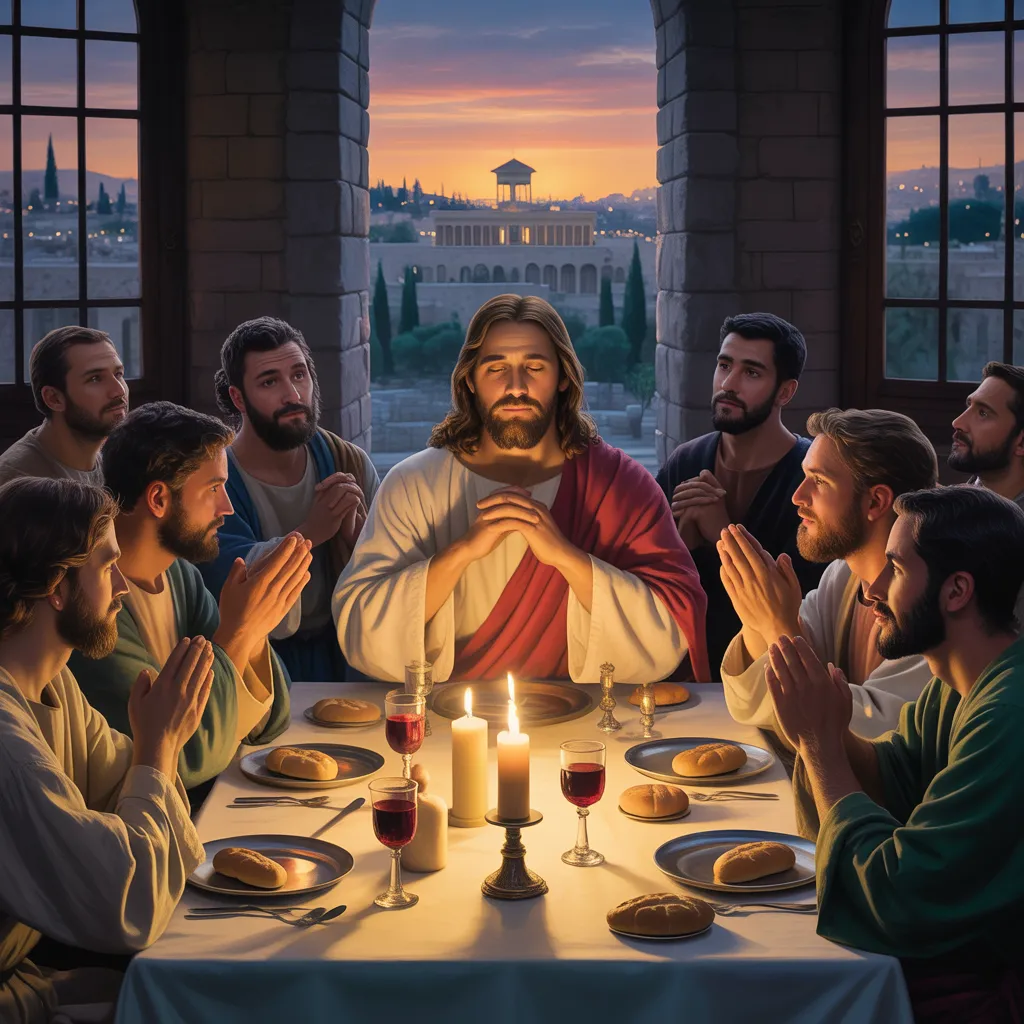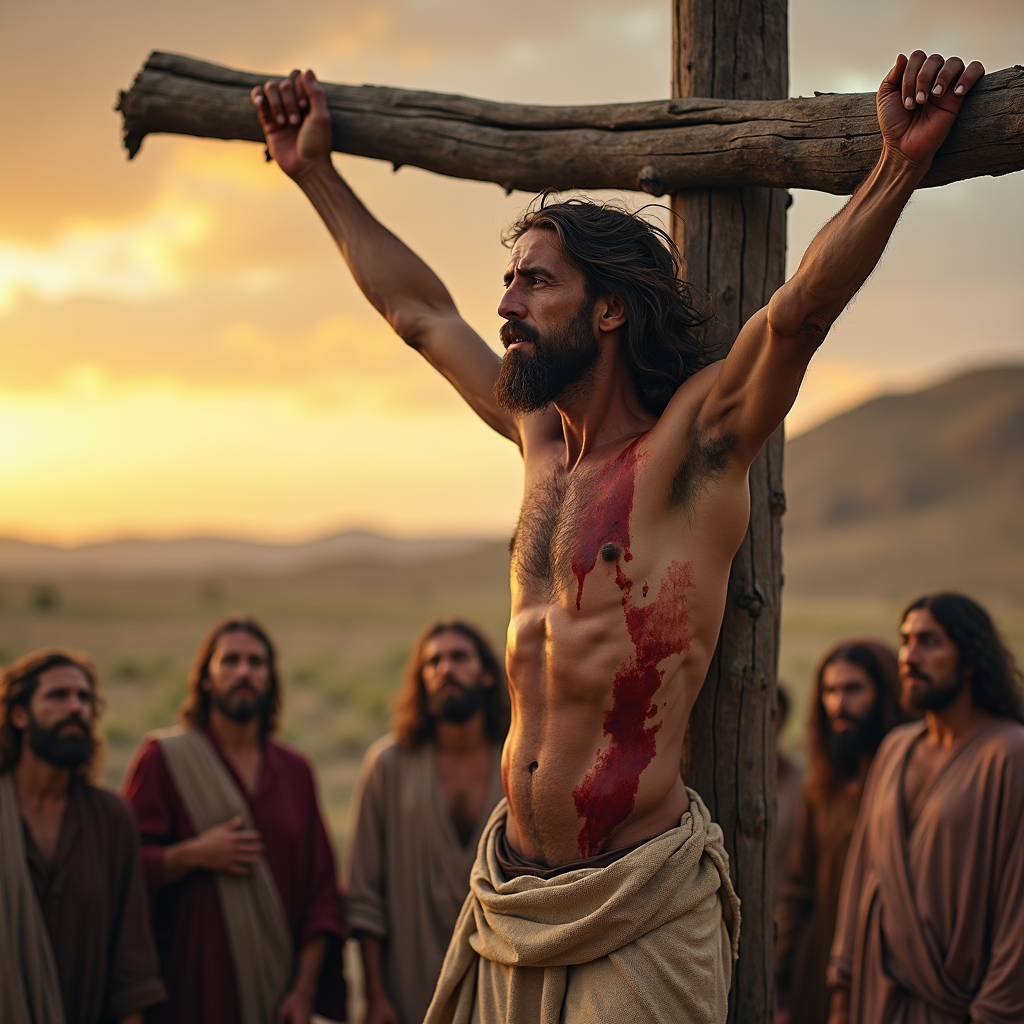
What Would You Do with 24 Hours to Live?
Let me start by asking a question that many of us have pondered: What would you do if you had only twenty-four hours to live? It’s a sobering thought that forces us to consider what truly matters. When a group of people were asked this question, their answers ranged from eating as many desserts as possible, going skydiving, robbing a bank, to even buying a sports car on credit. One response that stood out was simply: “I would wake up early.”
Most responses focused on the here and now—squeezing as much enjoyment or experience out of life before it ends. But what about Jesus? He knew exactly how much time He had left. What did He do in those final hours? The Bible records seven prayers that Jesus prayed, each revealing a different aspect of His relationship with the Father and His mission for us.
The First Prayer: A Prayer of Gratitude
The first of Jesus' prayers was one of gratitude. In Luke 22:19, during the Last Supper, Jesus took the
bread and gave thanks. This is significant because even in the face of imminent suffering and death, Jesus was thankful. He appreciated the provision, the fellowship, and the sacred moment He shared with His disciples.
This teaches us the importance of thankful prayers. Are we grateful for the blessings God has given us? Do we thank Him for meeting our needs daily? The Psalmist David reminds us in Psalm 37:25, “I have been young, and now am old; yet I have not seen the righteous forsaken, nor his children begging bread.” Gratitude is the foundation of faith and trust in God’s providence.
The Second Prayer: Jesus Prays for the Believers
Moving deeper into the night, Jesus prays for His followers. John 17 contains a beautiful and powerful
prayer where Jesus intercedes for all believers, including you and me. In verses 18-23, He prays for unity among His followers, that they may be sanctified through the truth and that the world might believe that God sent Him.
"I pray for them... that they all may be one, as You, Father, are in Me, and I in You; that they also may be one in Us, that the world may believe that You sent Me." (John 17:20-21)
This prayer reveals Jesus’ heart for His church and the mission of believers to reflect God’s love and truth in the world. It also reminds us that prayer for one another is vital. We are called to pray for unity and strength for fellow believers, especially in times of trial and challenge.

The Third Prayer: Interceding Against Satan’s Attacks
In Luke 22:31-32, Jesus specifically prays for Peter, who is about to face a severe spiritual test. Jesus says, “Simon, Simon, Satan has asked to sift you as wheat, but I have prayed for you that your faith may not fail.” This is an intercessory prayer, a powerful reminder that Jesus is actively praying for us to stand firm against the attacks of the enemy.
This leads me to share a personal story from a mission trip to Mexico in 2009. Our team was struck by a severe illness that left many of us bedridden. My own son became gravely ill, and we prayed fervently. Thousands of miles away, a friend in Michigan named Shelly Wiggins felt compelled to pray for us for hours. Her intercessory prayers were powerful, and God answered by delivering us from that crisis.
This experience confirms the biblical truth found in Our High Calling, page 177, which says, “This kind of prayer brings Jesus to the side... Prayer turns aside the attacks of Satan.” Intercessory prayer is a vital weapon in the Christian life, and Jesus modeled this for us in His final hours.
The Fourth Prayer: Submission to God’s Will
In the Garden of Gethsemane, Jesus prays a deeply personal and vulnerable prayer. Matthew 26:38-42 recounts His words: “My soul is exceedingly sorrowful, even unto death. ... Oh, My Father, if it is possible, let this cup pass from Me; nevertheless, not as I will, but as You will.”
This prayer reveals the struggle Jesus faced as He submitted His will to the Father’s plan of salvation. Despite the agony, He chose obedience. This prayer is a profound example of surrender and trust in God’s perfect will, even when it involves suffering. We too are called to this kind of submission. Often, we want our own way, but Jesus teaches us to pray, “Not my will, but Yours be done.” This is the heart of true faith.
The Fifth Prayer: Forgiveness for His Persecutors
While hanging on the cross, Jesus prays a prayer of forgiveness. Luke 23:34 records His words:
“Father, forgive them, for they know not what they do.” Even in the midst of excruciating pain and injustice, Jesus extends grace to those who crucified Him.
The Desire of Ages describes the scene: “All heaven was filled with wonder when the prayer of Christ was offered in the midst of His terrible suffering.” This prayer challenges us to forgive those who hurt us and to pray for those who persecute us. It’s not easy to forgive, but Jesus’ example shows us the power of grace and mercy. Are we praying forgiveness for those who have wronged us? Do we carry bitterness, or do we release it in prayer?
The Sixth Prayer: A Cry of Abandonment
At approximately 3 p.m., darkness covered the land as Jesus cried out with a loud voice, “Eloi, Eloi, lama sabachthani?” which means, “My God, My God, why have You forsaken Me?” (Mark 15:33-34). This prayer is a raw, heart-wrenching expression of abandonment and sorrow.
Jesus experienced the depth of human suffering and separation from God as He bore the sins of the world. This cry shows us that it is okay to bring our deepest pain and confusion to God. The Holy Spirit understands our groanings and presents them before God’s throne (Romans 8:26).
When we feel forsaken or overwhelmed, we can be bold to cry out to God honestly, just as Jesus did.

The Seventh Prayer: Commitment of His Spirit
Jesus’ final prayer is one of complete surrender and trust. Luke 23:46 tells us, “Father, into Your hands I commit My spirit.” With these words, Jesus breathed His last and entrusted everything to the Father.
This prayer is the culmination of His earthly mission and the ultimate act of faith. It reminds us that even in death, Jesus trusted God fully. Paul encourages us in 1 Corinthians 15:31 to die daily to self and live committed lives for Christ.
Our prayer life should reflect this same commitment—giving God our all, trusting Him with every aspect of our lives, and surrendering to His will.
Lessons from the Seven Prayers of Jesus
So, what can we learn from Jesus’ seven prayers in His last 24 hours? Here is a summary of the
prayers and their lessons for us:
1. Prayer of Gratitude: Always begin with thankfulness for God’s blessings.
2. Prayer for Believers: Pray for unity, sanctification, and strength for fellow believers.
3. Intercessory Prayer: Pray for protection against spiritual attacks and for those in need. 4. Submission to God’s Will: Surrender your desires to God’s plan, even in hardship.
5. Prayer for Forgiveness: Forgive those who hurt you and pray for their salvation.
6. Cry of Abandonment: Bring your deepest pain and doubts honestly before God.
7. Commitment of Spirit: Fully entrust your life and spirit to God’s care.
Each of these prayers reveals a different facet of a vibrant and authentic relationship with God. They show us how to pray in every circumstance—whether in joy, trial, sorrow, or surrender.
Why Is This Important Today?
We live in a world filled with distractions, busyness, and challenges that can pull us away from a deep
prayer life. The example of Jesus reminds us that prayer is not just a routine or a box to check; it is our lifeline to God. It is our source of strength, comfort, and guidance.
As the Bible says in 1 Peter 4:7, “The end of all things is at hand. Therefore be serious and watchful in your prayers.” We are living in the last days, and the stakes have never been higher. How will we spend our time? How will we prepare our hearts for the return of Jesus?
Prayer is the key. It is our privilege and joy to come before God, just as Jesus did, with all our hearts. To thank Him, to pray for one another, to intercede for those in need, to surrender our will, to forgive, to cry out honestly, and to commit ourselves fully to Him.

Personal Reflections and Encouragement
Reflecting on these prayers has challenged me to examine my own prayer life. Do I pray with gratitude? Do I intercede for others? Do I submit my will to God, especially when life is hard? Do I forgive those who have hurt me? Do I bring my deepest pains honestly to God? Am I fully committed to Him?
Let me share a testimony from a friend’s experience that highlights the power of prayer. A man named Moiz Rosara, son of Paul, survived a severe car accident in Michigan. As his car was crushed by a semi-truck, his only thought was to pray. Miraculously, he was unharmed, and the truck was demolished. This story is a living testimony to the power of prayer and God’s protection.
We are called to live with that same faith and commitment. To pray without ceasing, to trust God in every circumstance, and to hold fast to the hope we have in Jesus Christ.
Conclusion: Embracing the Prayer Life of Jesus
Jesus’ last 24 hours on earth were filled with prayer—prayers of gratitude, intercession, submission,
forgiveness, and surrender. These prayers are not just historical records; they are a guide for our own spiritual journey.
As we face the challenges of life and the realities of living in the last days, may we follow Jesus’ example. Let us cultivate a prayer life that is rich, honest, and faithful. Let us pray for one another, intercede for those in need, forgive as we have been forgiven, and commit our lives fully to God’s will.
Remember the words of Jesus: “Not my will, but Yours be done.” This is the prayer that changes hearts, transforms lives, and brings glory to God.
May God bless you as you seek to live a life of prayer modeled after our Savior, Jesus Christ.